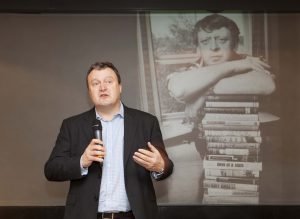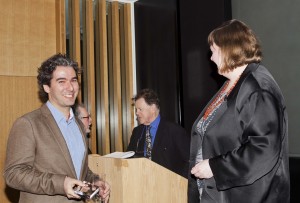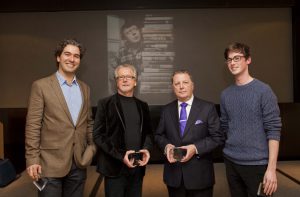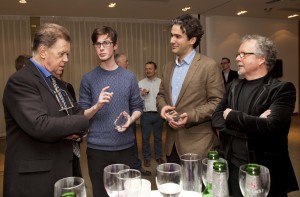Observer/Anthony Burgess Prize for Arts Journalism 2013: the winners
-
Burgess Foundation
- 21st February 2014
-
category
- Blog Posts
The International Anthony Burgess Foundation and the Observer were delighted to announce the winners of the 2013 Observer/Anthony Burgess Prize for Arts Journalism at a special event at King’s Place, London on Thursday 20 February.
Andrew Miller (CEO, Guardian Media Group) and Andrew Biswell (Director, International Anthony Burgess Foundation) welcomed a jubilant crowd to the awards ceremony. The prize, for the best piece of unpublished new writing on arts and culture, is now in its second year. Once again the range and volume of entries received from all over the world were perhaps only matched by Anthony Burgess’s own prolific and various journalistic writings.

The writer and broadcaster Jonathan Meades, chair of the judging panel, presented the awards. In his remarks he noted that ‘the most important thing is to be able to write. There is a problem with buffs, with experts, with those who are too close, with the participants. You don’t go to a pig to ask about charcuterie. If you want to know about football you don’t go to a footballer. There are thousands of people who have all the gen about camshafts or macrame or Georgian fanlights – this does not mean that they can write about them. As Julian Barnes has said, the difference between writers and non-writers is that writers are better at writing. The best pieces were the best written. They had some kind of detachment or angle, and an understanding of language. They were not producer journalism – not those great menaces to journalism, advertorial or PR-driven manipulation.’
Jonathan Meades also noted that there was unanimity among judges, with the same few pieces standing out; and that, in accordance with the rules of the competition, the judges had no idea of the identity of any of the authors. The novelist and historian Jane Stevenson, also on the judging panel, presented the prizes.

The winner was Roger Lewis, whose unexpected and unusual subject was the drag artist Arthur Lucan, better known as Old Mother Riley, whose wife played his daughter and left him to run a beauty parlour, at which point he teamed up with the failing horror actor Bela Lugosi. Roger Lewis’s piece can be read here.

In second place, Michael Perrett was Highly Commended for his essay defending plagiarism, stealing, borrowing, influence and homage with reference to John Cage’s practice of basing scores on extant scores, and comparing this strategy to the poet Kenneth Goldsmith’s verbatim transcriptions of newspapers to form Day. His piece can be read here.
In third place, Duncan Hamilton was Highly Commended for his memorable and moving piece about stammering and the consolations of literature, with specific reference to the consolation he found in the writing of a fellow stammerer, David Shields.
George Pendle was Commended for his review of The United States of Paranoia by Jesse Walker, in which he reflected on the nature of conspiracy theories.
Peter Kettle was Commended for his polemic on, as Jonathan Meades put it, ‘the prevailing fashion in art criticism, its thralldom to conceptual bollocks, its self-important use of artspeak to blind with pseudo-science, its dismissal of craft, its unthinking worship of Beuys, and its tongue’s willingness to damage Serota’s jejunum’.

The winner received a cheque for £2000, and all the writers received replica trophies of the ‘Critic of the Year’ award presented to Anthony Burgess in 1979 by Margaret Thatcher, one of the few prizes won by Burgess in the UK.
The 2014 prize will be launched in April, with full details on the Burgess Foundation website and in the press.


